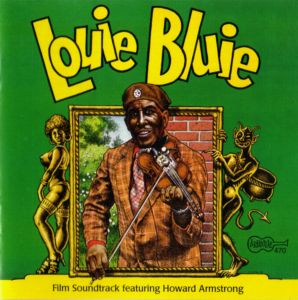
- Format: MP3

Review of this CD by Richie Unterberger
The soundtrack to the Louie Bluie film has Howard Armstrong in informal settings with various musicians, including Ted Bogan, Ikey Robinson, Yank Rachell, and Tom Armstrong. The selection of material gives a good indication of the breadth of the songster's repertoire, with ragtime, songs in German and Polish, blues, and a bawdy version of "Darktown Strutter's Ball" with much explicit profanity. If you're a casual blues fan and want a representative disc of the songster genre, you could do a lot worse than this, especially as the clear fidelity is far superior to what's possible from remastered 78s. And if you need some of those remastered 78s, the disc isn't a total loss either, as it has the 1934 single he issued under the name "Louie Bluie," "Ted's Stomp"/"State Street Rag," which has some expert, speedy violin (on "Ted's Stomp") and mandolin (on "State Street Rag") by Armstrong. The CD reissue adds four songs from 1929-1938 not on the original Arhoolie LP: "Vine Street Drag" by the Tennessee Chocolate Drops, two sides by Sleepy John Estes with Yank Rachell (including the famous "Milk Cow Blues"), and a 1938 single by Yank Rachell.
Armsrtong biography by Jason Ankeny
Country bluesman Howard Armstrong was born March 4, 1909 in Dayton, Tennessee; one of 11 children, as a youngster he fashioned his first fiddle out of a goods box strung with horsehair. Honing his musical skills in his family band, as a teen he began performing alongside Knoxville performers Ted Bogan and Carl Martin in groups like the Tennessee Chocolate Drops and the Four Aces. Armstrong's groups were exceptions to the rule of the era which dictated that black performers perform only material from the segregated "race music" catalogs; their repertoire included not only old-time jigs, reels, waltzes, rags and minstrel show favorites, but also current jazz, blues and Tin Pan Alley hits.
In 1930, the Chocolate Drops made their radio debut and cut their first sides for the Vocalion label. During the Depression, the trio of Howard, Bogan and Martin lived on the road, playing throughout the Appalachian circuit and appearing with a medicine show headed by one Dr. Leon D. Bondara. By the early 1930s they found themselves in Chicago, regularly playing the city's South Side and Maxwell Street flea market area; living on tips left them in dire financial straits, however, and they soon began "pullin' doors" — playing stores and taverns in the white immigrant areas, where the Italian, Polish and German which Armstrong learned to speak as a child growing up in multi-ethnic La Follette opened doors that most other black performers found barred.
By the end of the decade, the popularity of radio and the emergence of the jukebox brought Armstrong's professional playing days to a halt; however, during the 1970s his few recordings were rediscovered by folk music scholars, and he reunited with Bogan and Martin to tour college campuses, coffeehouses and festivals. After Martin's 1978 death, the surviving duo forged on, and in 1985 they became the subject of the feature documentary Louie Bluie, a film directed by Terry Zwigoff. The accompanying soundtrack also introduced Armstrong's music to new fans through its mix of new recordings and vintage sides dating back to the 1930s.
Armstrong continued to perform well into the new millennium. He and his wife/manager Barbara Ward married in 1996 and took up residency in her hometown of Boston. She was also the drummer of Armstrong's band. His solo album Louie Bluie won a W. C. Handy award from the Blues Foundation a year prior. On July 30, 2003, Armstrong died from complications after a heart attack he suffered in March. He was 94.